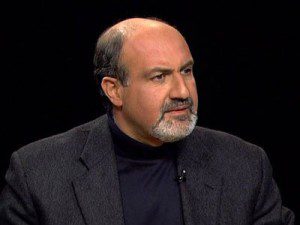 A Changed Man
A Changed Man
There are many ways we are influenced in life and in business. It has been my experience that the most profound changes have been inspired by people I have known only through published work (books, interviews, etc). Individuals who caused me to question my assumptions and reevaluate my beliefs thereby allowing me to arrive at new understandings, be aware of my biases, and continue the process of refinement. The list is long, but in this post I’d like to focus on someone who was (and still is) key in shaping my thinking. He is Nassim Taleb, the author of 5 books, a philosopher, professor, a statistician, a former options trader, adviser to the International Monetary Fund, and an outspoken critic of the financial industry.
Like many people, I was first introduced to Taleb through his book, “The Black Swan” in 2007 (although unlike some of his critics, I actually read the book). There was one phrase in particular that created a paradigm shift in my thinking: “absence of evidence, is not evidence of absence.” In other words, just because you can’t see something (or quantify it), that does not mean it doesn’t exist. It’s been over 6 years since first reading those words, and I still feel the weight of their implication.
Blissfully Ignorant No More
His books (The Black Swan and Fooled by Randomness) opened my mind to the asymmetry of the risk return relationship in my business (investing) and life. Phrases within the financial industry became absurdities, and I soon developed a skepticism of commonly espoused strategies and instruction. It was this skepticism that led me into other bodies of knowledge and research that touched my life. Economics, politics, asset allocation, agriculture, the environment, parenting, the principles were consistently applicable, resulting in errors due to a lack of intellectual honesty. If you can’t accept or even consider that you might be wrong, you won’t look for alternatives.
His latest book, “Antifragile: Things that Gain From Disorder” is among the most insightful and directly applicable books I’ve read. The opposite of fragile is not robust…to survive is not enough. The opposite of fragile is antifragile. To benefit from adversity, volatility, and the like. As a parent, I can use an antifragile philosophy to prepare my children for adulthood, in business I can use it to turn a previous weakness into strength and benefit from tribulations.
NNT talks to the Stanford ETL Class
Nassim Taleb is someone I admire for his insight, commitment to excellence, and his ability to remain true to himself and his beliefs in spite of enormous financial success. Lately, he has also assumed the mantle of exposing charlatans and calling a spade a spade. It’s one thing to point out fallacies…quite another to name names. He sums it up nicely with his first ethical rule:
If you see fraud and do not say fraud, you are a fraud.
He follows it up with a promise:
If I call someone a dangerous ethically challenged fragilista in private after the third glass of Lebanese wine (white), I will be obligated to do so here.
Taleb is an interesting combination of a brilliant mind with a well read education and a practitioner who is acting on his philosophy. I’m thankful for his insights and inspiration.
How About You?
Who do you admire?
What books have inspired you?
